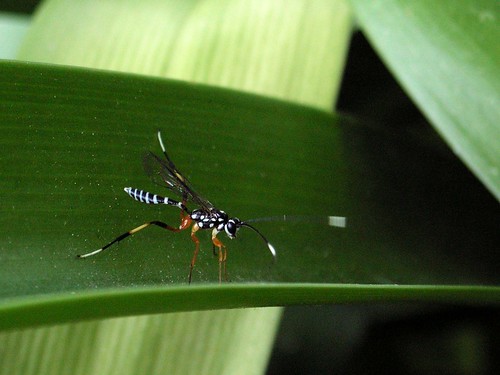Sunday, May 30, 2010
Sunday Spinelessness - The Wasp That Did For Darwin's Faith?
I own that I cannot see as plainly as others do, and as I should wish to do, evidence of design and beneficence on all sides of us. There seems to me too much misery in the world. I cannot persuade myself that a beneficent and omnipotent God would have designedly created the Ichneumonidae ...
Here's one the Ichneumonidae, the family of wasps that Darwin couldn't fit into a world with a loving god.
What could Darwin find so abhorrent about such a fine looking creature? It was their unique approach to parenting the put Darwin off. Ichneumon are diligent parents, to make sure their offspring have all the food they could ever need the wasps lay their eggs in the bodies of other insects. The larva develops within the host insect, carefully keeping the doomed creature alive as it eats its way through first its fat stores then its non-essential organs. Finally, with the larvae almost fully grown it turns its attention to the host's essential organs before it eats its way through the skin. The ichneumon life-cycle was the inspiration for the chest bursting aliens in the Alien movies.
The quote that started this post is often presented as an observation unique to Darwin, or even as a sort of epiphany that did for Darwin's faith. In fact, Darwin was repeating what had become an old saw by the time he wrote it. The ichneumon lifecycle was widely discussed by Victorian naturalists and theologians. At that time there was a great deal of interest in an idea called natural theology, which amounted to learning about god by studying his creation. But some pats of nature don't seem to reveal a beneficent god. The natural theologians managed to convince themselves that the lion hadn't yet laid down with the lamb because predators saved their prey a worse fate, but the idea of ichhneumon larvae rasping away at their hosts from the inside out proved a greater challenge.
Stephen Jay Gould wrote an essay on the problem of the ichneumon which lists some of the ways natural theologians tried to deal with it. William Kirby, the great entomologists who also happened to be a reactor, emphasized the great dedication of the wasp to her offspring and praised the larvae's sustainable approach to eating their hosts while saving mroe live tissue for later. For modern readers it seems very odd to be describing wasps as virtuous. By and large we've come to realise that nature doesn't provide moral lessons, but we haven't quite given up the naturalistic fallacy that drove the natural theologians. How many times have you hear peddlers of snake oil claim their product was safe "because it's natural"? Or people object to genetic engineering or vaccines because they are unnatural?
We even still look on nature as a source for morality, proponents on either side of the debate for gay rights swap statistics on how common homosexuality is among other animals - as if the sex lives of bonobos or prairie voles had anything to do with human rights. If there is a lesson to learn from the gruesome life-cycle of the Ichneumonidae it's that nature just is, and we need to turn elsewhere for moral lessons.
Hold on, these posts are meant to be about celebrating weird bugs. Let's end with the great David Attinbrorough on the Ichneumonidae.
Labels: environment and ecology, Helpis minitabunda, ichneumonidae, insects, photos, sci-blogs, wasp




